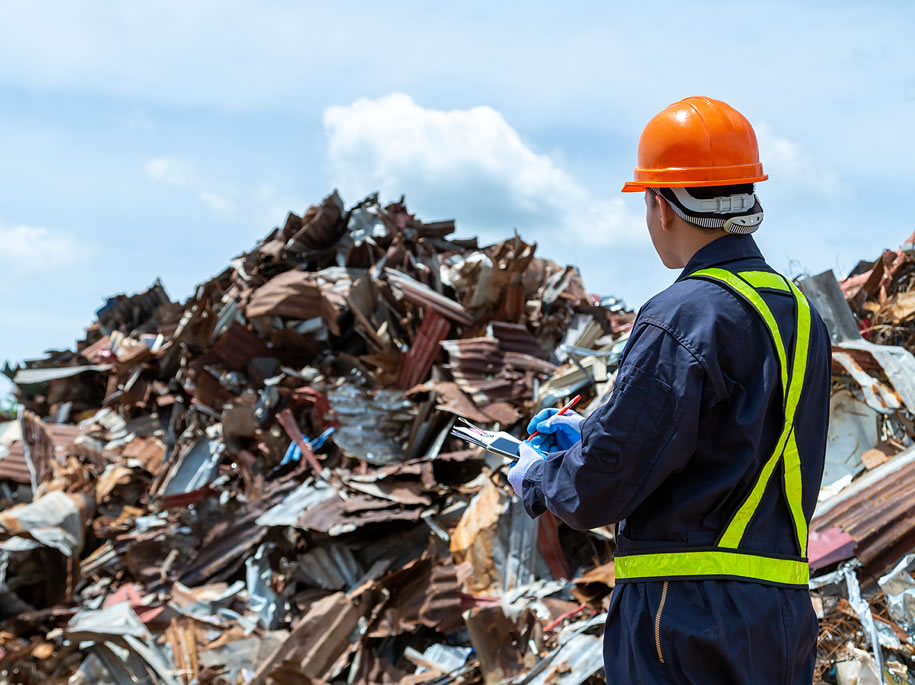For dumpster, container, and large loads please call
For dumpster, container, and large loads please call

If you have a pile of old appliances, wiring, or machinery sitting around, you might be sitting on more value than you think. It’s important to know what type of metal you have and how it’s classified at a recycling facility. M&M Recycling works with individuals and businesses to process metals, but the process starts with you knowing whether your scrap is ferrous or non-ferrous. It affects pricing, handling, and how quickly you can turn your material into cash. Once you understand the difference, you’ll be better prepared to work with a scrap metal buyer and get the most out of your haul. Let’s look closely at what each category means so you can have more confidence with scrap metal recycling.
Ferrous metals contain iron. These metals are strong, durable, and usually magnetic. Because of these properties, they’re widely used in construction, automotive manufacturing, heavy equipment, and tools. Steel is the most common ferrous metal you’ll encounter. It’s an alloy made mostly from iron with varying amounts of carbon and other elements. Structural beams, car frames, and industrial machinery contain steel. Cast iron appears in items like old radiators, heavy cookware, and engine blocks. The presence of iron means these metals can rust when exposed to moisture and oxygen. That’s why you see corrosion on older ferrous scrap, such as weathered pipes or outdoor equipment. Rust doesn’t make them worthless, but it can affect the weight and condition, which are factors in pricing. A quick way to check is to use a magnet. If it sticks, then you’re probably dealing with a ferrous material. It's simple, but reliable enough for separating materials before you bring them to a scrap metal company.
Non-ferrous metals do not contain iron, which gives them different qualities and uses. They are lighter, resistant to corrosion, and non-magnetic and includes metals like aluminum, copper, brass, lead, and zinc. Aluminum is easy to shape and found in everything from soda cans to airplane parts. Copper is highly conductive, which makes it important for wiring, motors, and electronics. Brass is popular in plumbing fixtures and decorative hardware. Lead is very dense and used in batteries, while zinc is important for galvanizing steel to prevent rust. Because these metals resist corrosion, they are valuable in applications where exposure to the elements is unavoidable. They also tend to have higher per-pound values in the recycling market compared to ferrous metals. This makes them attractive to anyone who collects scrap for resale. Non-ferrous metals can be identified by their lighter weight and lack of magnetic attraction. The color can also be a clue. Copper has a reddish hue, brass has a yellow-gold appearance, and aluminum is silver-gray and lightweight.
Separating ferrous from non-ferrous metals before arriving at the yard saves time and can improve your payout. Scrap yards process materials differently because they have different melting points, refining processes, and market values. Ferrous metals are abundant, which means they fetch a lower price per pound. However, they are heavier, so larger volumes can still bring in a pretty good amount. Non-ferrous metals are less common and can command higher prices even in small quantities. By sorting your scrap ahead of time, you make the work faster for yourself and the scrap metal company in Barnesville handling your load. You also avoid the risk of valuable non-ferrous metals being overlooked or mixed with lower-value ferrous scrap. Understanding the category your material falls into also helps you communicate clearly with a scrap metal buyer. When you can identify the metal type, you’ll have more realistic expectations about pricing and payment.
Once you’ve separated ferrous from non-ferrous metals, take a few extra steps to prepare them for recycling. These steps can increase the value and will make the process simple when you arrive at the yard.
Some recyclers also require certain materials to be drained of fluids or stripped of hazardous components before acceptance. Always check ahead of time to avoid delays.
Knowing the difference between ferrous and non-ferrous metals is the first step in getting the best value for your scrap. Learning how to identify, separate, and prepare your materials makes the recycling process faster, safer, and more profitable. A scrap metal buyer will appreciate your preparation, and you’ll be in a better position to negotiate fair pricing. If you’re ready to turn your unwanted metals into cash, M&M Recycling is here to make it happen. We are an experienced scrap metal company and are excited to welcome you. Give us a call today or visit our location to get started.